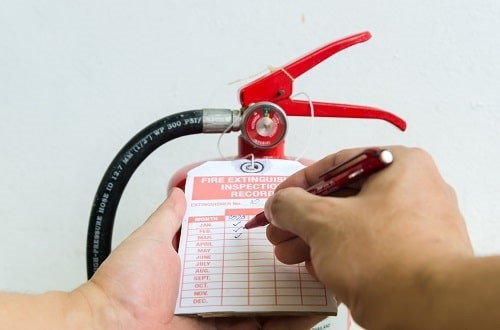With fire safety duties becoming ever more stringent following the Grenfell tragedy, it is crucial that ‘Responsible Persons’ (and other relevant safety roles) only specify and hire appropriate fire safety organisations who have been independently assessed and certificated to evidence their competence.
Features
Getting help with fire safety: competence is key
There are substantial updates being introduced to how fire safety is managed, and health and safety professionals are required to step up to the proverbial plate to ensure they continue to meet their fire safety obligations as best as possible and in a suitable manner. While this may be nothing new to seasoned individuals, there are some key facts everyone should be aware of.
Fire safety responsibilities have been introduced under Section 156 of the Building Safety Act 2022, placing more stringent requirements on the Responsible Person. From October 2023, there will be comprehensive obligations to record multiple details including, but not exhaustive to:
- Who the Responsible Person or persons are (such as identities/organisations, contact information/address, and where shared responsibilities are present)
- The completed fire risk assessment (and who completed this), and significantly
- The fire safety arrangements in place.
This last point is of extreme importance to those responsible for fire safety, as it will now be a fundamental legal requirement to be able to demonstrate how fire safety is managed in the premises. This should therefore also include details of organisations that the Responsible Person has employed to perform specific works required on-site. The fire safety industry does however have an obstacle at present – namely a lack of clarity about who is defined as ‘competent’.
 Photograph: iStock/Vajira Thongsom
Photograph: iStock/Vajira Thongsom
Noticeably complicated
There are areas of the health and safety field that are extremely straightforward, such as gas work. Since it is a mandatory requirement to use Gas Safe registered organisations/engineers by law, safety practitioners understand this, and will only employ appropriate organisations to help them meet their gas work requirements. This requirement is also understood on a far wider scale across the public due to widespread knowledge of the law and this regime.
However, when a Responsible Person at a premises is looking for appropriate organisations and individuals to help them meet their fire safety requirements and obligations, the fire safety industry can be complicated. The answer to this problem is regulation. The fire safety industry is not regulated in the same way the gas safety industry is, and this introduces undesirable confusion. Currently, the fire safety industry is regulated by the fire safety industry itself, and there are differing opinions and views on how the work of providers of fire safety should be monitored.
There are multiple organisations, trade associations and professional bodies in the fire safety industry (with what feels like more acronyms than you can count) that provide Responsible Persons for premises options to find a ‘competent’ organisation and/or individual to help them meet their fire safety responsibilities. However, BAFE seeks to inform and educate Responsible Persons and the public about the existence of a clear, robust method and system for checking the competence of fire safety organisations at the hiring stage. This is UKAS Accredited Third-Party Certification – more commonly known as third-party certification.
UKAS Accredited Third-Party Certification
For the uninitiated, the BAFE Fire Safety Register establishes, develops and maintains competency schemes for third-party certification. Under the BAFE schemes, fire safety organisations can obtain independent third-party certification via an audit by a UKAS accredited certification body to demonstrate they are competent to offer specific fire safety works, such as fire risk assessment, and the design, installation, commissioning and maintenance of fire detection and fire alarm systems, and emergency lighting systems to name a few.
The BAFE schemes set out the conditions that must be met by an organisation to provide objective evidence of their competency for the specific fire safety work they offer, including the management system that underpins this. For example, fire risk assessment is covered by the ‘BAFE SP205 Life Safety Fire Risk Assessment Scheme’. These schemes are audited via UKAS accredited third-party certification bodies – such as BSI, NSI, SSAIB and others – who independently audit the organisations against the specified conditions.
To achieve third-party certification to one of the BAFE competency schemes, the organisation must complete a successful audit and then be regularly re-assessed (usually on an annual basis) by the UKAS accredited third-party certification body. This enables the Certification Body to confirm the organisation is maintaining the required standard of competence and management criteria for the work (or works) they provide. Once an organisation has achieved this, they are added to the BAFE Fire Safety Register, which is a free and publicly available record of these evidentially competent organisations.
Although many readers of Safety Management will no doubt already be aware of UKAS, it is important to highlight the importance of UKAS’s involvement in overseeing the third-party certification bodies that audit fire safety organisations to ensure they are competent in line with the BAFE competency schemes.
 Dr Justin Maltby-Smith is group managing director of BAFE Fire Safety Register. Photograph: BAFE
Dr Justin Maltby-Smith is group managing director of BAFE Fire Safety Register. Photograph: BAFE
BAFE competency scheme audits are usually delivered on an annual basis via UKAS accredited certification bodies to provide a robust and consistent assessment process. This means that BAFE, as the owner of the schemes, has no bias, authority or involvement over the audits themselves. This therefore means that BAFE treats any BAFE registered organisation, from a sole trader to a national organisation, as impartially as possible.
The independent audit of these organisations, by a third-party certification body that is itself independently accredited by UKAS, therefore focuses on obtaining objective, quality evidence of the organisation’s (and their relevant employed individual’s) competence.
If an organisation can demonstrate to the UKAS accredited certification body that they are able to carry out specific works in a safe and competent manner (to a BAFE scheme), they are permitted on the BAFE Fire Safety Register. If they cannot successfully pass an audit to a satisfactory standard, then they are not. If a current BAFE registered organisation has non-compliance issues raised against them on a surveillance audit, and these are not suitably resolved in the prescribed time scales, their certification may be suspended or in severe cases be withdrawn completely.
At the time of writing, the fire safety industry has begun to take steps to self-regulate to demonstrate the capabilities of organisations. BAFE (working with UKAS accredited certification bodies) already provides an avenue for organisations to demonstrate their competence (under the BAFE competency schemes and BAFE Fire Safety Register), but it is currently completely voluntary and there is no requirement for organisations or individuals to evidence their capability under schemes like BAFE.
Although achieving certification can sometimes be expensive and time-consuming for a fire safety organisation, BAFE is confident that achieving third-party certification under schemes like the BAFE Fire Safety Register raises the competency bar to a significant extent (compared to other claims of competence). It also provides value and confidence to both the organisation undergoing the audit and their customers, including the Responsible Person.
Meeting obligations
Clearly, in a post-Grenfell world, Responsible Persons are likely to face scrutiny and judgment over how they select organisations to help them meet their fire safety obligations. It is no longer acceptable for the selection process to be a race to the bottom, aimed solely at saving as much money as possible and doing the absolute minimum.
Fire safety legislation and guidance is first and foremost in place to protect life. Qualified, skilled and professional safety practitioners are expected to have the aptitude – and exercise due diligence – to source appropriate and competent organisations who will properly carry out the fire safety work required. This is where UKAS Accredited Third-Party Certification shines, as any organisation that voluntarily chooses to be audited on an annual basis is already clearly acting with competence in mind.
Responsible Persons, dutyholders, employers and safety practitioners must ask themselves – am I confident that my choice of fire safety organisations would be justifiable in court? If there is any hesitation over this, it is vital to immediately review any contract in place, verify the provider’s claimed credentials and source new contractors if the existing provider’s competence cannot be substantiated. The Responsible Person should be recording all these actions to demonstrate they are adequately managing fire safety, but it is now the time for Responsible Persons to also ensure they formally verify an organisation’s competency before employing their services.
Verification
For the BAFE competency schemes, only UKAS accredited certification bodies are licensed by BAFE to perform the independent audits of each fire safety organisation’s competence. The online BAFE Fire Safety Register collates all these appropriately third-party certificated organisations to offer a main, searchable hub of organisations with this quality evidence of their competency (for specific life and fire safety works).
At BAFE, we have worked on how we can make the verification process as quick and simple as possible for the Responsible Person. As of August 2022, all BAFE Registered Organisations have been able to provide customers with their BAFE Registered Organisation ID number (found in the blue bar of their issued BAFE logo). This unique six-digit ID number can be entered onto the BAFE online verification tool, and the results will show the BAFE schemes they have gained third-party certification for and which UKAS Accredited Certification Body performed their audit. We believe it has never been easier to verify the third-party certification (to BAFE schemes) held by an organisation.
For additional third-party certification not covered by the BAFE schemes, these can often be verified via the relevant UKAS-accredited certification body’s website, as most will have an online search facility for this purpose.
It is important to stress these registers, including the BAFE Fire Safety Register, are usually completely free for public access. With BAFE there is no login required, and no fees or additional actions the Responsible Person needs to take to gain access to this information.
If an organisation is claiming specific third-party certification and this cannot be verified online for whatever reason, BAFE strongly recommends contacting the relevant certification/registration body to verify this before awarding any contract or allowing work to commence so you can be certain of an organisation’s objective evidence of competency for the specific fire safety work required.
BAFE strongly recommends that Responsible Persons (and those in other safety roles) make verification of any organisation’s claims of competency for specific life safety services a mandatory action in their decision-making process. The verification should be recorded to help the Responsible Person demonstrate their ongoing compliance with fire safety legislation, and the new requirements being introduced in October 2023.
UKAS-Accredited Third-Party Certification – recommended by UK government
“Third-party quality assurance can offer comfort both as a means of satisfying you that goods and services you have purchased are fit for purpose, and as a means of demonstrating that you have complied with the law.”
Source: gov.uk/workplace-fire-safety-your-responsibilities/fire-risk-assessments (Assessment guides)
Search ‘fire safety in the workplace’ online to find this government guidance.
Dr Justin Malty-Smith is group managing director of BAFE Fire Safety Register
For further information on the BAFE competency schemes available, the UKAS accredited certification bodies BAFE works with, and to find/verify BAFE Registered Organisations, visit:
FEATURES

From crisis to prevention: the urgent role of employers in upstreaming health
By Dr Julie Riggs, British Safety Council on 16 June 2025
Poor public health and long-term sickness absence are placing extreme financial pressure on the UK’s health and social care system and the overall economy. However, by investing in workplace health prevention programmes and education initiatives, employers can help reduce the scale of ill health among the population and minimise the associated costs for society and business alike.

The AI safety revolution: augmentation, not elimination
By Alex Nichol, Notify Technology on 16 June 2025
Artificial Intelligence looks set to vastly reduce the amount of time and effort required to record, create and analyse occupational safety and ESG data, procedures and performance, while automatically providing insight into areas for improvement and areas of excellence.

Protecting lone workers: a structured approach is critical
By Naz Dossa, Peoplesafe on 06 June 2025
Whether dealing with the public in their homes or working in remote locations, lone workers face a variety of risks to their health, safety and wellbeing. It’s therefore vital that employers systematically identify and assess the specific hazards lone workers face and then implement suitable measures to mitigate them.



